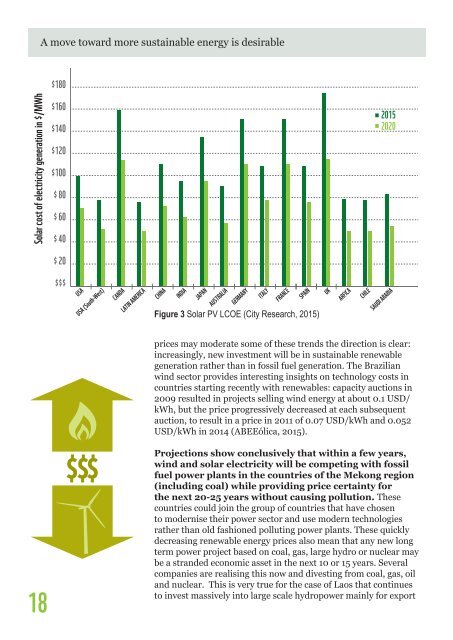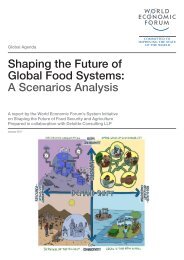Vision 2050
wwf_greater_mekong_power_sector_vision_2050
wwf_greater_mekong_power_sector_vision_2050
You also want an ePaper? Increase the reach of your titles
YUMPU automatically turns print PDFs into web optimized ePapers that Google loves.
A move toward more sustainable energy is desirable<br />
$200<br />
$180<br />
Solar cost of electricity generation in $/MWh<br />
$160<br />
$140<br />
$120<br />
$100<br />
$ 80<br />
$ 60<br />
$ 40<br />
$ 20<br />
2015<br />
2020<br />
$$$<br />
USA<br />
USA (South-West)<br />
CANDA<br />
LATIN AMERICA<br />
CHINA<br />
INDIA<br />
JAPAN<br />
AUSTRALIA<br />
GERMANY<br />
ITALY<br />
FRANCE<br />
SPAIN<br />
Figure 3 Solar PV LCOE (City Research, 2015)<br />
UK<br />
ARFICA<br />
CHILE<br />
SAUDI ARABIA<br />
18<br />
$ $$<br />
prices may moderate some of these trends the direction is clear:<br />
increasingly, new investment will be in sustainable renewable<br />
generation rather than in fossil fuel generation. The Brazilian<br />
wind sector provides interesting insights on technology costs in<br />
countries starting recently with renewables: capacity auctions in<br />
2009 resulted in projects selling wind energy at about 0.1 USD/<br />
kWh, but the price progressively decreased at each subsequent<br />
auction, to result in a price in 2011 of 0.07 USD/kWh and 0.052<br />
USD/kWh in 2014 (ABEEólica, 2015).<br />
Projections show conclusively that within a few years,<br />
wind and solar electricity will be competing with fossil<br />
fuel power plants in the countries of the Mekong region<br />
(including coal) while providing price certainty for<br />
the next 20-25 years without causing pollution. These<br />
countries could join the group of countries that have chosen<br />
to modernise their power sector and use modern technologies<br />
rather than old fashioned polluting power plants. These quickly<br />
decreasing renewable energy prices also mean that any new long<br />
term power project based on coal, gas, large hydro or nuclear may<br />
be a stranded economic asset in the next 10 or 15 years. Several<br />
companies are realising this now and divesting from coal, gas, oil<br />
and nuclear. This is very true for the case of Laos that continues<br />
to invest massively into large scale hydropower mainly for export




